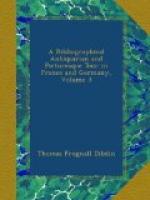“Favours to none, to all she smiles extends.”
Among the gentlemen, I observed a young man of a very prepossessing form and manners—having seven orders, or marks of distinction hanging from his button-holes. Every body seemed anxious to exchange a word with him; and he might be at farthest in his thirtieth year. I could not learn his name, but I learnt that his character was quite in harmony with his person: that he was gay, brave, courteous and polite: that his courage knew no bounds: that he would storm a citadel, traverse a morass, or lead on to a charge, with equal coolness, courage, and intrepidity: that repose and inaction were painful to him—but that humanity to the unfortunate, and the most inflexible attachment to relations and friends, formed, equally, distinctive marks of his character. This intelligence quite won my heart in favour of the stranger, then standing and smiling immediately before me; and I rejoiced that the chivalrous race of the Peterboroughs was not yet extinct, but had taken root, and “borne branch and flower,” in the soil of Suabia.
When it came to my turn to be addressed, the king at once asked—“if I had not been much gratified with the books in the Public Library, and particularly with two ancient editions of Virgil?” I merely indicated an assent to the truth of this remark, waiting for the conclusion to be drawn from the premises. “There has been some mention made to me (resumed his Majesty) about a proposed exchange on the part of Lord Spencer, for these two ancient editions, which appear to be wanting in his Lordship’s magnificent collection. For my part, I see no objection to the final arrangement of this business—if it can be settled upon terms satisfactory to all parties.” This was the very point to which I was so anxious to bring the conference. I replied, coolly and unhesitatingly, “that it was precisely as his Majesty had observed; that his own Collection was strong in Bibles, but comparatively weak in Ancient Classics: and that a diminution of the latter would not be of material consequence, if, in lieu of it, there could be an increase of the former—so as to carry it well nigh towards perfection; that, in whatever way this exchange was effected, whether by money, or by books, in the first instance, it would doubtless be his Majesty’s desire to direct the application of the one or the other to the completion of his Theological Collection.”




